七年级下册英语知识点整理
人教版七年级英语下册各知识点归纳总结
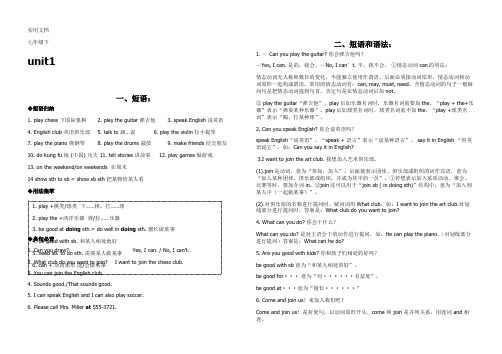
七年级下unit1一、短语:◆短语归纳1. play chess 下国际象棋2. play the guitar 弹吉他3. speak English 说英语4. English club 英语俱乐部5. talk to 跟…说6. play the violin 拉小提琴7. play the piano 弹钢琴8. play the drums 敲鼓9. make friends 结交朋友10. do kung fu 练 (中国) 功夫 11. tell stories 讲故事 12. play games 做游戏13. on the weekend/on weekends 在周末14 show sth to sb = show sb sth 把某物给某人看◆用法集萃◆典句必背1. Can you draw? Yes, I can. / No, I can’t.2. What club do you want to join? I want to join the chess club.3. You can join the English club.4. Sounds good./That sounds good.5. I can speak English and I can also play soccer.6. Please call Mrs. Miller at 555-3721.二、短语和语法:1. — Can you play the guitar? 你会弹吉他吗?—Yes, I can. 是的,我会。
—No, I can’t. 不,我不会。
①情态动词can的用法:情态动词无人称和数目的变化,不能独立使用作谓语,后面必须接动词原形,情态动词和动词原形一起构成谓语。
常用的情态动词有:can, may, must, need。
含情态动词的句子一般疑问句是把情态动词提到句首,否定句是在情态动词后加not。
七年级下册英语必背知识点
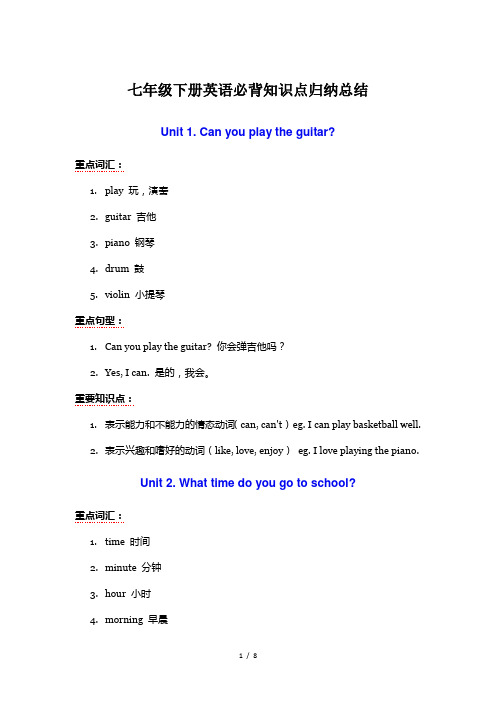
七年级下册英语必背知识点归纳总结Unit 1. Can you play the guitar?重点词汇:1.play 玩,演奏2.guitar 吉他3.piano 钢琴4.drum 鼓5.violin 小提琴重点句型:1.Can you play the guitar? 你会弹吉他吗?2.Yes, I can. 是的,我会。
重要知识点:1.表示能力和不能力的情态动词(can, can't)eg. I can play basketball well.2.表示兴趣和嗜好的动词(like, love, enjoy)eg. I love playing the piano.Unit 2. What time do you go to school?重点词汇:1.time 时间2.minute 分钟3.hour 小时4.morning 早晨5.afternoon 下午6.evening 晚上重点句型:1.What time do you get up? 你几点起床?2.I usually go to school at 7:30. 我通常七点半去上学。
重要知识点:1.表示时间的问答方式和用法eg. What time is it now? It's half past eight.2.表示日常生活习惯的一般现在时eg. I usually do my homework afterschool.Unit 3. How do you get to school?重点词汇:1.bike 自行车2.walk 步行3.bus 公交车4.subway 地铁5.taxi 出租车重点句型:1.How do you get to school? 你怎么去上学?2.I usually take the bus. 我通常坐公交车。
重要知识点:1.表示交通工具的名词和用法eg. I ride a bike to school every day.2.表示方式的副词和表达方式eg. He walks to work every morning.Unit 4. Don’t eat in class.重点词汇:1.don't do sth. 不要做某事2.eat 吃3.drink 喝4.talk 谈话5.listen 听6.music 音乐重点句型:1.Don't talk in class. 上课时不要讲话。
七年级下册英语知识点复习(完整版)
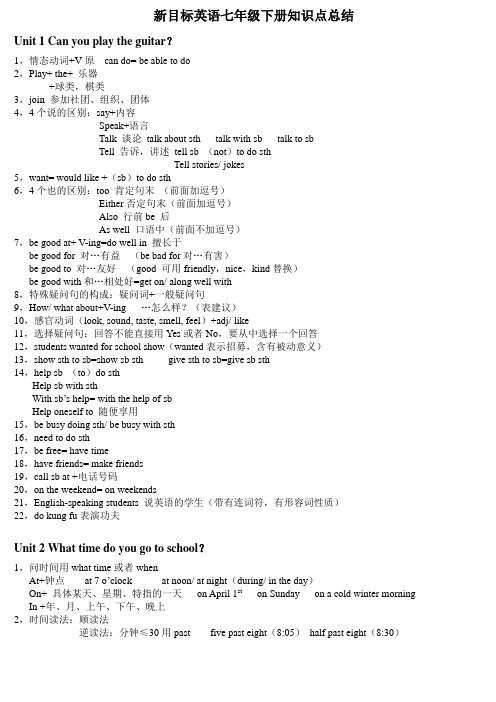
新目标英语七年级下册知识点总结Unit 1 Can you play the guitar?1,情态动词+V原can do= be able to do2,Play+ the+ 乐器+球类,棋类3,join 参加社团、组织、团体4,4个说的区别:say+内容Speak+语言Talk 谈论talk about sth talk with sb talk to sbTell 告诉,讲述tell sb (not)to do sthTell stories/ jokes5,want= would like +(sb)to do sth6,4个也的区别:too 肯定句末(前面加逗号)Either否定句末(前面加逗号)Also 行前be 后As well 口语中(前面不加逗号)7,be good at+ V-ing=do well in 擅长于be good for 对…有益(be bad for对…有害)be good to 对…友好(good 可用friendly,nice,kind替换)be good with和…相处好=get on/ along well with8,特殊疑问句的构成:疑问词+一般疑问句9,How/ what about+V-ing …怎么样?(表建议)10,感官动词(look, sound, taste, smell, feel)+adj/ like11,选择疑问句:回答不能直接用Yes或者No,要从中选择一个回答12,students wanted for school show(wanted表示招募,含有被动意义)13,show sth to sb=show sb sth give sth to sb=give sb sth14,help sb (to)do sthHelp sb with sthWith sb’s help= with the help of sbHelp oneself to 随便享用15,be busy doing sth/ be busy with sth16,need to do sth17,be free= have time18,have friends= make friends19,call sb at +电话号码20,on the weekend= on weekends21,English-speaking students 说英语的学生(带有连词符,有形容词性质)22,do kung fu表演功夫Unit 2 What time do you go to school?1,问时间用what time或者whenAt+钟点at 7 o’clock at noon/ at night(during/ in the day)On+ 具体某天、星期、特指的一天on April 1st on Sunday on a cold winter morning In +年、月、上午、下午、晚上2,时间读法:顺读法逆读法:分钟≤30用past five past eight(8:05)half past eight(8:30)分钟>30用to a quarter to ten(9:45)整点用…o’clock 7 o’clock(7:00)3,3个穿的区别:wear 表状态,接服装、手套、眼镜、香水等Put on 表动作,接服装Dress 表动作,接sb/ oneself get dressed穿衣3,感叹句:How+adj+主谓!How+adj+a/an +n单+主谓!What+ a/an +adj+ n单+主谓!What+ adj+ n复/ 不可数+主谓!4,from…to…5,be/ arrive late for6,频度副词(行前be 后)Always usually often sometimes seldom hardly never7,一段时间前面要用介词for for half an hour for five minutes8,eat/ have…for breakfast/ lunch/ dinner/ supper9,either…or10,a lot of=lots of11,it is +adj+for sb +to do sth (adj修饰to do sth)It is important for me to learn English.it is +adj+of sb +to do sth (adj修饰sb)It is kind/ friendly/ nice of you to help me.Unit 3 How do you get to school?1,疑问词How 如何(方式)how long 多长(时间)答语常用“(For/ about +)时间段”how far多远(距离)答语常用“(It’s +)数词 +miles/ meters/ kilometers”how often多久一次(频率)答语常用“Always/ often/ every day/…”或“次数+时间”等表频率的状语How soon多快,多久以后,常用在将来时中。
七年级下册英语语法知识点归纳总结
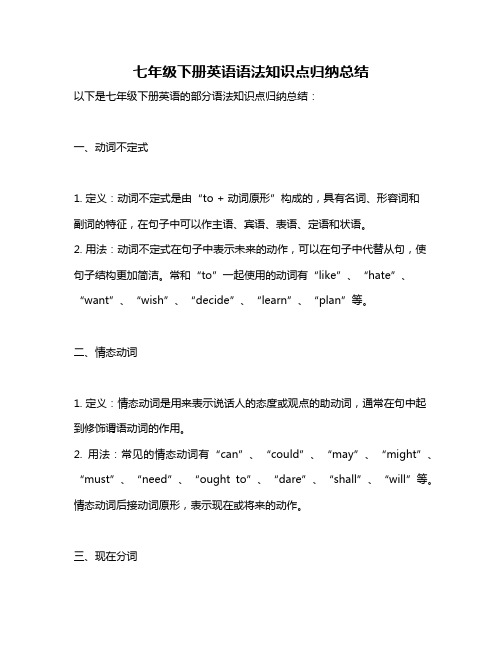
七年级下册英语语法知识点归纳总结以下是七年级下册英语的部分语法知识点归纳总结:一、动词不定式1. 定义:动词不定式是由“to + 动词原形”构成的,具有名词、形容词和副词的特征,在句子中可以作主语、宾语、表语、定语和状语。
2. 用法:动词不定式在句子中表示未来的动作,可以在句子中代替从句,使句子结构更加简洁。
常和“to”一起使用的动词有“like”、“hate”、“want”、“wish”、“decide”、“learn”、“plan”等。
二、情态动词1. 定义:情态动词是用来表示说话人的态度或观点的助动词,通常在句中起到修饰谓语动词的作用。
2. 用法:常见的情态动词有“can”、“could”、“may”、“might”、“must”、“need”、“ought to”、“dare”、“shall”、“will”等。
情态动词后接动词原形,表示现在或将来的动作。
三、现在分词1. 定义:现在分词是动词的一种形式,具有形容词的特征,可以表示正在进行的动作或状态。
2. 用法:现在分词可以作定语、表语和状语。
常和“-ing”一起使用的动词有“seeing”、“feeling”、“thinking”、“doing”、“being”等。
四、介词短语1. 定义:介词短语是由介词和名词或代词构成的短语,用来表示时间、地点、方式等。
2. 用法:介词短语在句子中可以作状语、定语和表语。
常见的介词有“in”、“on”、“at”、“for”、“with”、“by”等。
五、连词1. 定义:连词是用来连接两个句子或从句的词语,表示它们之间的关系。
2. 用法:常见的连词有“and”、“but”、“or”、“so”、“because”、“if”等。
连词在句子中起到承上启下的作用,使句子的意思更加清晰。
以上是七年级下册英语的部分语法知识点归纳总结,希望对你有所帮助。
七年级下册英语知识点归纳总结
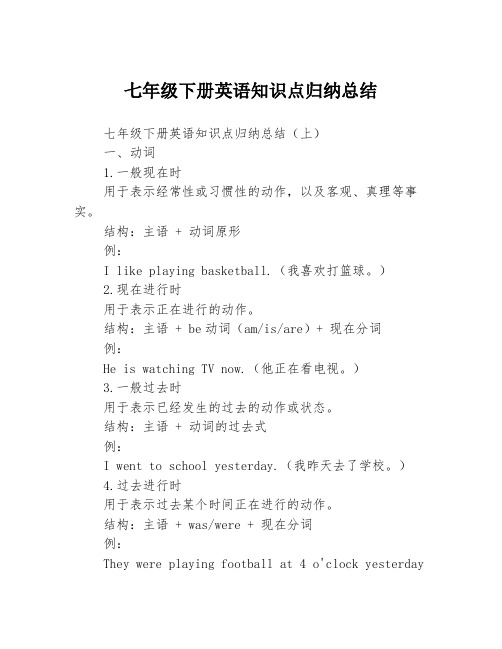
七年级下册英语知识点归纳总结七年级下册英语知识点归纳总结(上)一、动词1.一般现在时用于表示经常性或习惯性的动作,以及客观、真理等事实。
结构:主语 + 动词原形例:I like playing basketball.(我喜欢打篮球。
)2.现在进行时用于表示正在进行的动作。
结构:主语 + be动词(am/is/are)+ 现在分词例:He is watching TV now.(他正在看电视。
)3.一般过去时用于表示已经发生的过去的动作或状态。
结构:主语 + 动词的过去式例:I went to school yesterday.(我昨天去了学校。
)4.过去进行时用于表示过去某个时间正在进行的动作。
结构:主语 + was/were + 现在分词例:They were playing football at 4 o'clock yesterdayafternoon.(他们昨天下午4点正在踢足球。
)5.将来时用于表示将来某个时间要发生的事情。
结构:主语 + will/shall + 动词原形例:We will have a picnic next Saturday.(我们下周六去野餐。
)二、数词1.基数词表示数量的数字,如:one(1)、two(2)、three(3)等。
2.序数词表示顺序的数字,如:first(第一)、second(第二)、third(第三)等。
3.小数表示不是整数的数。
如:0.5、1.25等。
4.百分数表示百分比的数,如:50%、80%等。
三、名词1.可数名词表示能够用数目进行计算的名词,如:book(书)、student(学生)等。
2.不可数名词表示无法用数目进行计算的名词,如:water(水)、milk(牛奶)等。
3.复数名词表示“多个”的名词。
规则:在词尾加-s。
如:books(书)、students(学生)等。
四、形容词用于修饰名词或代词。
1.形容词的比较级用于表示两者之间的比较。
七年级英语下册单元知识点总结
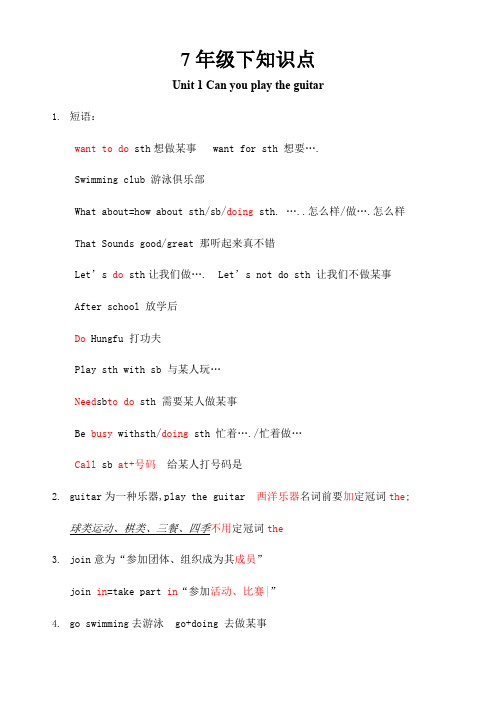
7年级下知识点Unit 1 Can you play the guitar1.短语:want to do sth想做某事 want for sth 想要….Swimming club 游泳俱乐部What about=how about sth/sb/doing sth. …..怎么样/做….怎么样 That Sounds good/great 那听起来真不错Let’s do sth让我们做…. Let’s not do sth 让我们不做某事After school 放学后Do Hungfu 打功夫Play sth with sb 与某人玩…Need sb to do sth 需要某人做某事Be busy withsth/doing sth 忙着…./忙着做…Call sb at+号码给某人打号码是2.guitar为一种乐器,play the guitar 西洋乐器名词前要加定冠词the;球类运动、棋类、三餐、四季不用定冠词the3.join意为“参加团体、组织成为其成员”join in=take part in“参加活动、比赛|”4.go swimming去游泳go+doing 去做某事5.注意区分:speak, say, talk和tella)①say说话 What can you sayb)②speak+语言c)③talk表示两个人或多个人在一起讲话、谈论多指随意谈论talk with sb与某人交谈 talk to sb 向某人说… talk about谈论…;d)④tell的意思是“告诉,讲述,吩咐”,讲故事或讲笑话多用tell;6.Show “表演,演出,出示……给某人看”, show sth. to sb.=show sb. sth.;7.show作名词,意为“展览,展出”on show “在展出” car show 车展;school show 学校公演fashion show 时装表演;a flower show花展8.help sth. 在……方面帮助某人help sth.帮助某人….. help sth.帮助某人干什么;a)I often help him do his homework.b)I often help him his homework.9.be good with... 与……相处得好;与……合得来=get on well withbe good at doing sth擅长做某事 be good for对……有益处;be good to sb 对某人好10.Can you play the guitar你能弹吉他吗情态动词:不能单独做谓语动词;无人称、单复数变化;后接动词原形1.表示能力能;会;如:He can speak English.他会说英语;2.表示许可,意为“可以”,这时可以和may通用,但是比may较正式;如:Can I use your pen我可以用你的钢笔吗3.表示可能性,意为“可能”,这时常出现在否定句中;如:It can’t be true.这不可能是真的;4.表示提供帮助;如:Can you help me你可以帮助我吗1.肯定句:主语+can+动词原形+其他;如:2.否定句:主语+can’t+动词原形+其他;如:3.一般疑问句:Can+主语+动词原形+其他肯定答语:Yes,主语+can.否定答语:No,主语+can’t.如:4.特殊疑问句:疑问词+can+主语+动词原形+其他如:What can I do for you我能为你做点什么呢Unit 2 What time do you go to school1.重点短语:get up 起床 get dressed 穿衣服 get on上车 get off 下车get home到达家中get to work到达工作岗位practice guitar 练吉它 practice doing sth练习做…leave home 离家take a shower = have a shower 洗淋浴澡have/eat breakfast/dinner/lunch 吃早、晚、午饭go to bed 睡觉反义词get upput on 穿衣服反义词take offdo one’s homework 做家庭作业tell sb. about sth. 告诉某人某事love to do = like to do 喜欢干某事 like doing sth at around/about six o’clock 六点左右in the morning/afternoon/evening 在早上/下午/晚上listen to 听…on weekends=at the weekend 在周末on school days 在学校上课日late for… …. 迟到了lots of =a lot of 许多a good /bad habit 好习惯take a walk=have a walk 散步live a happy life 过着幸福的生活2英语时间的表达What is the time 几点了It’s….1直接法:6:10 →six-ten 8:50→eight-fifty6:00 →six o’clocko’clock可省2借助介词to/past分钟数+to/past+小时小于等于30分钟“past” 超过10:15→ a quarter past ten或fifteen past ten 9:30→half past nine或thirty past nine大于30分钟“to”差….到….翻译时要注意时钟要加111:50→ten to twelve9:45→a quarter to ten或fifteen to ten3 what time与when的区别what time “几点”问的是具体的时间,回答要具体到小时;What time do you go to school你什么时候/几点上学when提问,回答既可以是具体的时间,也可以是不具体的时间,如:in the morning,last year,in 1998等范围大的时间;例如:When does he take a shower他什么时候洗澡He takes a shower in the morning.他在早上洗澡;也可用具体时间:I take a shower at 6 o’clock in the morning.我早上六点洗澡;3、 listen to, hear和sound△listen to意为“注意听”,表示有意识地去听,但不一定听得见什么,强调听的动作;They are listening to the teacher. 他们在听老师说;△hear意为“听见”,强调听的结果;如:I’m sorry to hear that.听到那个消息我很难过;△sound意为“听起来,听上去”,可作系动词+形容词The music sounds sweet. 这音乐听起来悦耳;Unit 3 How do you get to school1、重点短语搭配take the subway 乘地铁every day 每天think of 认为 think about 考虑between…and….在…和…之间 next to在旁边come true 实现I think so 我也这样认为I don’t think so 我不这样认为It’s easy /difficult for sb to do sth 对某人而言做什么是很容易/困难的it is easy to get to school到达学校很容易on a ropeway 坐缆索cross the river 穿过河流one 11-year-old boy 一个11岁的男孩红色部分为一个形容词I’m 11years old 我11岁quickly 动作上快 fast 速度上快 soon时间上快the river runs quickly 河水流的快ten minutes’ walk / a ten-minute walk =10 minutes on foot 10分钟的路be afraid to do/ be afraid of sth / doing害怕做某事why not +v原形 == why don’t you +v原形为什么不...........how to do it 怎么来做它what to do 做什么what do you think of =how do you like你觉得怎么样how long does it take sb to do sth花费某人多长时间做某事crossing the river is… 穿过河是…ing型动词做主语谓语动词用单数2、How do you get to school你怎样到达学校交通方式的表达:1 take/ride/drive + a/the +交通工具take a bus/car…2by +交通工具 by bus/car3on/in + a/the +交通工具in:封闭/半封闭/小型工具;on:大型4ride/fly/drive to +交通工具= go to +地点+by+交通工具walk to+地点= go to+地点on foot.eg: I drive to school every day.= I go to school by carI walk to school every day.= I go to school on foot3、spend, cost, pay 与 take区别(1)spendsb spend…on sth或spend…in doing sth.意为“某人花时间/金钱做某事”;eg: I spent 5 dollars on the book.=I spend 5 dollars buying the book.(2)coststh cost sb some money意为“某物花费某人多少钱”;eg: The skirt costs her 200 yuan.(3)paysb pay money for sth.意为“某人为某物付款”;eg: He paid 1000 yuan for the TV set.(4)takeIt takes sb time/ money to do sth.eg: It took him seven days to make the big cake.4、Then the early bus takes him to school.take…to…意为“把…带去…” bring….to….把…带来….5、how far用来提问距离,意为“多远;How far is it from A to B=How far is B from A A 到B有多远①用长度单位表示eg: —— How far is it from your home to the bus stop ——It’s five kilometers.②用时间表示eg: —— How far is the park from the shop——It’s ten minutes’ walk.6、how long 用来提问时间,意为“多久”;eg: —— How long have you been in America—— For two years. for+短时间表示“长达…”7、say, speak, talk与tell8、look, read, see与watch9、there be 句型就近原则There is no bridge=there is not a bride 这儿没有桥◆unit 4 Don’t eat in class.1、重点短语与句型on time准时 in time 及时fight for 为….而斗 fight against 为反对….而战斗 fight with 与…一起战斗go outsider 去外面It’s important for sb to do sth 对…人而言做…是很重要的practice sth/ doing sth 练习…/练习做…do the dishes 清洗餐具make bed 铺床be strict with sb 对某人严格remember/forget to do sth 记得/忘记要做…remember/forget doing sth 记得/忘记做过…follow the rules 遵守规则learn from sb/sth 从…..学习 learn to do sth 学会做某事be late for school 上学迟到have to 不得不don’t have to=needn’t 不必 must 的一般疑问句否定回答school uniform 校服on school nighs 在上学日的晚上too much+不可数名词“太多” too many +可数名词的复数“太多”much too + 形容词/副词“太….”in the kitchen 在厨房let/make/have sb do sth 让某人做某事good luck 好运keep+形容词保持… keep quiet 保持安静=be quietkeepsb doing sth 一直做某事 He keeps me waiting for him a long time. 他让我等了他很久keep sb from doing sth 阻止某人做某事have fun doing sth 很高兴做某事。
人教版七年级下册英语各单元知识点大归纳
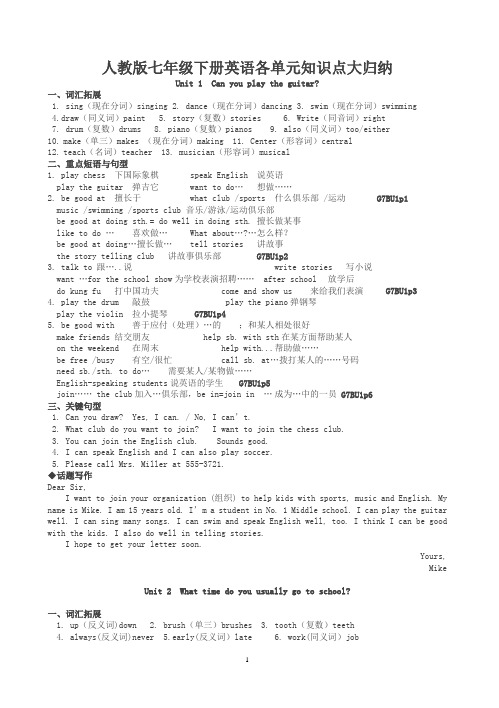
人教版七年级下册英语各单元知识点大归纳Unit 1 Can you play the guitar?一、词汇拓展1. sing(现在分词)singing2. dance(现在分词)dancing3. swim(现在分词)swimming4.draw(同义词)paint5. story(复数)stories6. Write(同音词)right7. drum(复数)drums 8. piano(复数)pianos 9. also(同义词)too/either10.make(单三)makes (现在分词)making 11. Center(形容词)central12.teach(名词)teacher 13. musician(形容词)musical二、重点短语与句型1. play chess 下国际象棋 speak English 说英语play the guitar 弹吉它want to do…想做……2. be good at 擅长于 what club /sports 什么俱乐部 /运动G7BU1p1music /swimming /sports club 音乐/游泳/运动俱乐部be good at doing sth.= do well in doing sth. 擅长做某事like to do …喜欢做… What about…?…怎么样?be good at doing…擅长做… tell stories讲故事the story telling club 讲故事俱乐部G7BU1p23. talk to 跟…..说 write stories 写小说want …for the school show为学校表演招聘…… after school放学后do kung fu 打中国功夫 come and show us 来给我们表演G7BU1p34. play the drum 敲鼓 play the piano弹钢琴play the violin 拉小提琴 G7BU1p45. be good with 善于应付(处理)…的;和某人相处很好make friends 结交朋友 help sb. with sth在某方面帮助某人on the weekend 在周末 help with...帮助做……be free /busy 有空/很忙call sb. at…拨打某人的……号码need sb./sth. to do…需要某人/某物做……English-speaking students说英语的学生G7BU1p5join…… the club加入…俱乐部,be in=join in …成为…中的一员G7BU1p6三、关键句型1. Can you draw? Yes, I can. / No, I can’t.2. What club do you want to join? I want to join the chess club.3. You can join the English club. Sounds good.4. I can speak English and I can also play soccer.5. Please call Mrs. Miller at 555-3721.◆话题写作Dear Sir,I want to join your organization (组织) to help kids with sports, music and English. My name is Mike. I am 15 years old. I’m a student in No. 1 Middle school. I can play the guitar well. I can sing many songs. I can swim and speak English well, too. I think I can be good with the kids. I also do well in telling stories.I hope to get your letter soon.Yours,Mike Unit 2 What time do you usually go to school?一、词汇拓展1. up(反义词)down2. brush(单三)brushes3. tooth(复数)teeth4. always(反义词)never5.early(反义词)late6. work(同义词)job7. night(反义词)day 8. half(复数)halves 9. run(现在分词)running10. clean(现在分词)cleaning 11. either…or… (反义词)neither …nor…12. life(复数)lives 13. taste(单三)tastes二、重点短语与句型1.get up 起床,站起 get dressed穿上衣服 have/take a shower 洗淋浴brush teeth涮牙 eat breakfast 吃早餐 What time 几点,何时go to school 去学校 do homework 做家庭作业G7BU2p72. at night 在晚上from…to…从……到…… G7BU2p8in the morning 在上午 go to work 去上班That's a funny time for…那是做……有意思的时间。
七年级下册Unit 1知识点梳理
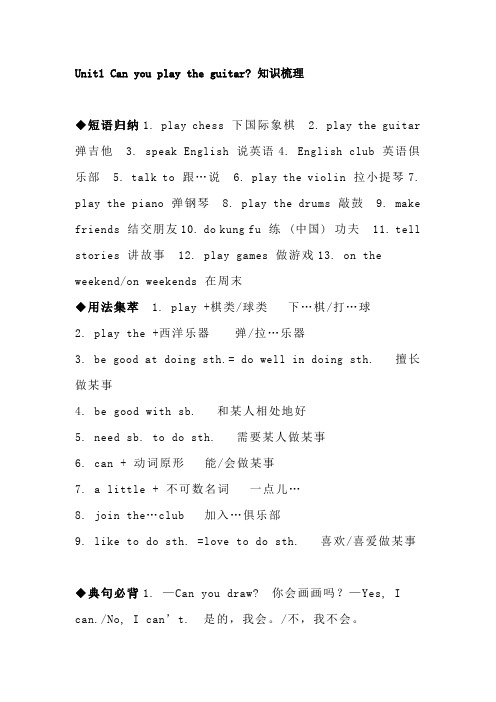
Unit1 Can you play the guitar? 知识梳理◆短语归纳1. play chess 下国际象棋 2. play the guitar 弹吉他 3. speak English 说英语4. English club 英语俱乐部 5. talk to 跟…说 6. play the violin 拉小提琴7. play the piano 弹钢琴8. play the drums 敲鼓9. make friends 结交朋友10. do kung fu 练 (中国) 功夫11. tell stories 讲故事12. play games 做游戏13. on the weekend/on weekends 在周末◆用法集萃 1. play +棋类/球类下…棋/打…球2. play the +西洋乐器弹/拉…乐器3. be good at doing sth.= do well in doing sth. 擅长做某事4. be good with sb. 和某人相处地好5. need sb. to do sth. 需要某人做某事6. can + 动词原形能/会做某事7. a little + 不可数名词一点儿…8. join the…club 加入…俱乐部9. like to do sth. =love to do sth. 喜欢/喜爱做某事◆典句必背1. —Can you draw? 你会画画吗?—Yes, I can./No, I can’t.是的,我会。
/不,我不会。
2. —What club do you want to join? 你想加入哪个俱乐部?—I want to join the chess club. 我想加入国际象棋俱乐部。
3. You can join the English club. 你可以加入英语俱乐部。
4. Sounds good./That sounds good. 听上去很好。
七年级下册1到6单元英语知识点

七年级下册1到6单元英语知识点
以下是七年级下册英语1到6单元的一些主要知识点:
1. Unit 1: Personal Information
-介绍自己的基本信息,如姓名、年龄、国籍等。
-问与回答关于个人信息的问题。
-学习使用形容词来描述自己和他人。
2. Unit 2: School Life
-学习和使用关于学校生活的词汇,如科目、课程表、校园设施等。
-学习描述日常活动和时间表。
-学习使用一般现在时来表达习惯和常规。
3. Unit 3: Hobbies and Interests
-学习和使用关于爱好和兴趣的词汇,如运动、音乐、艺术等。
-学习表达自己的喜好和不喜欢。
-学习使用动词的-ing形式来描述正在进行的活动。
4. Unit 4: Daily Routines
-学习和使用关于日常生活的词汇,如起床、吃早餐、上学等。
-学习描述日常活动的顺序和时间。
-学习使用一般现在时来描述日常例行事务。
5. Unit 5: Food and Health
-学习和使用关于食物和健康的词汇,如水果、蔬菜、饮食习惯等。
-学习表达食物的喜好和不喜欢。
-学习使用情态动词can和should来表达能力和建议。
6. Unit 6: Travel and Transportation
-学习和使用关于旅行和交通的词汇,如旅游景点、交通工具等。
-学习描述旅行计划和行程。
-学习使用一般将来时来表达将来的计划和打算。
七年级下册英语知识点归纳总结

七年级下册英语知识点归纳总结一、词汇与短语1. 学校科目:Math, Science, History, Geography, English, Chinese, Art, Music, PE (Physical Education)2. 学校设施:Library, Canteen, Gym, Playground, Computer lab, Auditorium3. 常见动词:Play, Sing, Dance, Draw, Read, Write, Listen, Speak, Think4. 常见形容词:Big, Small, Happy, Sad, Tall, Short, Young, Old, Beautiful, Ugly5. 日常活动:Get up, Brush teeth, Take a shower, Eat breakfast, Go to school, Have classes, Do homework, Watch TV, Go to bed6. 常见名词:Book, Pen, Pencil, Eraser, Notebook, Teacher, Student, Parent, Friend7. 常见介词:In, On, Under, Behind, Between, Next to, Across from, Above, Below8. 常见副词:Quickly, Slowly, Carefully, Loudly, Quietly, Well, Badly, Often, Never二、语法要点1. 时态- 一般现在时:表示经常发生的动作或状态,如:I usually play soccer on weekends.- 一般过去时:表示过去某一时间发生的动作或状态,如:He visited his grandparents last weekend.- 一般将来时:表示将来某一时间将要发生的动作,如:Theywill go on a trip next month.2. 代词- 人称代词主格:I, You, He, She, It, We, They- 物主代词:My, Your, His, Her, Its, Our, Their- 反身代词:Myself, Yourself, Himself, Herself, Itself, Ourselves, Themselves3. 冠词- 不定冠词:A, An (用于单数可数名词前)- 定冠词:The (用于特指的人或物前)4. 介词短语- 表示时间:At + 时间点 (at 8:00), On + 具体日期 (on Monday)- 表示地点:In + 大地方 (in the library), At + 小地方 (at the bus stop)5. 简单句和并列句- 简单句:只有一个主谓结构的句子,如:The dog barks.- 并列句:用并列连词连接的两个或多个简单句,如:She is smart and she works hard.6. 情态动词- Can, Could: 表示能力或许可,如:Can you help me? Could you open the window?- May, Might: 表示可能性,如:It might rain later.- Must, Have to: 表示必须,如:You must do your homework. We have to go now.三、阅读理解技巧1. 快速浏览(Skimming):快速阅读文章,抓住主旨大意。
七年级下册英语全部语法知识点
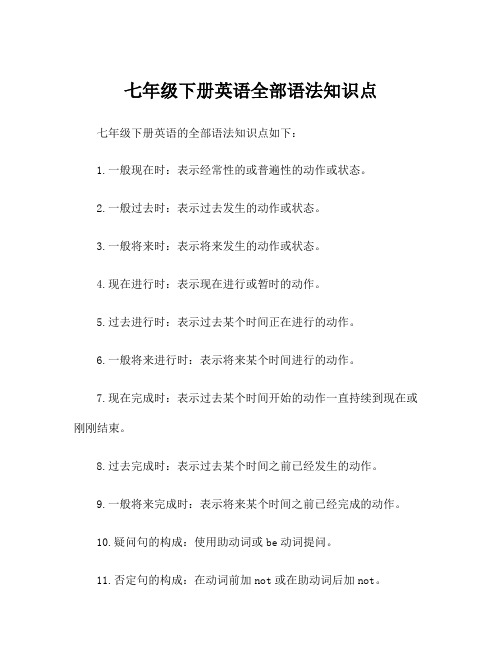
七年级下册英语全部语法知识点七年级下册英语的全部语法知识点如下:1.一般现在时:表示经常性的或普遍性的动作或状态。
2.一般过去时:表示过去发生的动作或状态。
3.一般将来时:表示将来发生的动作或状态。
4.现在进行时:表示现在进行或暂时的动作。
5.过去进行时:表示过去某个时间正在进行的动作。
6.一般将来进行时:表示将来某个时间进行的动作。
7.现在完成时:表示过去某个时间开始的动作一直持续到现在或刚刚结束。
8.过去完成时:表示过去某个时间之前已经发生的动作。
9.一般将来完成时:表示将来某个时间之前已经完成的动作。
10.疑问句的构成:使用助动词或be动词提问。
11.否定句的构成:在动词前加not或在助动词后加not。
12.肯定句的构成:直接陈述句子的内容。
13.比较级和最高级:用于比较两个或更多事物的形容词和副词。
14.表示数量的词汇:例如:all, most, some, any, few, a few, many, much等。
15.可数名词和不可数名词的用法。
16.单复数形式的变化规则。
17.形容词的用法和位置:用于修饰名词的词汇。
18.物主代词的用法:例如:mine, yours, his, hers, ours, theirs等。
19.反身代词的用法:例如:myself, yourself, himself, herself, ourselves, themselves等。
20.动词不定式的用法:用于表示目的、意图、结果等。
21.情态动词的用法:例如:can, could, may, might, must等。
22.介词的用法:表示位置、时间、原因、目的等。
23.祈使句的用法:用于发出命令、请求等。
24.从句的引导词和用法:例如:because, if, when, where, who等。
25.定语从句和状语从句的用法。
26.非谓语动词的用法:包括动词不定式、动名词和现在分词。
以上就是七年级下册英语的全部语法知识点。
七年级英语下册知识点总结

• 三. A ______ baby can only cry.
•
A. two month B. two months C. two-month-old D.two months old
• 四.Our school is
[在...对面]my house.
• Look, There is _______ over there. Do you know him?
•
My uncle will leave for the USA.
•
三.离开A地去B地: leave +A + for +B
•
My uncle will leave China for the USA.
• 九、stop 作名词时为“站” bus top
•
作动词时为“停止”,句型为:stop doing sth.停止正在做的事
• He is afraid of dogs.
• He is afraid of crossing the river. • [二]be afraid to do sth. 害怕做某事 He is afraid to go out at night.
• 七、He is like a father to me.
◆句型结构梳理
• 一、距离的表达法 • “A+be+距离+from+B”表示A地离B地有多远 • My home is about 一0 kilometers from school. • “be far away from” 表示离......多远,但是有具体的距离时则不要用far. • My home isn’t far away from the school. • His home is five kilometers away from the school.
七年级下册英语知识点大全
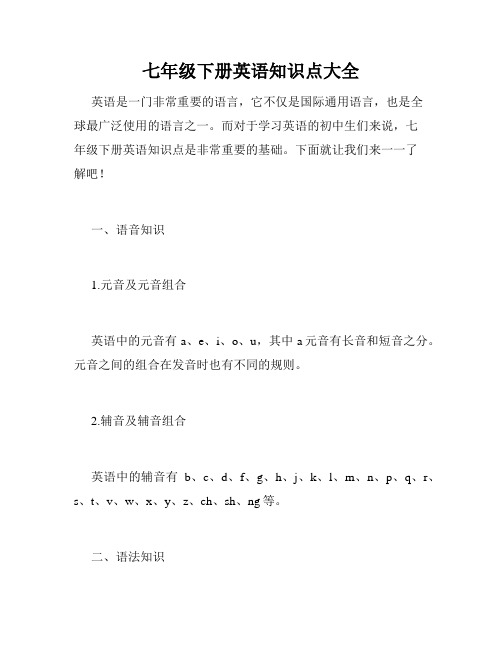
七年级下册英语知识点大全英语是一门非常重要的语言,它不仅是国际通用语言,也是全球最广泛使用的语言之一。
而对于学习英语的初中生们来说,七年级下册英语知识点是非常重要的基础。
下面就让我们来一一了解吧!一、语音知识1.元音及元音组合英语中的元音有a、e、i、o、u,其中a元音有长音和短音之分。
元音之间的组合在发音时也有不同的规则。
2.辅音及辅音组合英语中的辅音有b、c、d、f、g、h、j、k、l、m、n、p、q、r、s、t、v、w、x、y、z、ch、sh、ng等。
二、语法知识1.to be动词的变化be动词在不同的人称、单复数及时态下都有不同的变化。
如:I am, he is, we are等。
2.一般现在时表示现在正在进行的动作或状态,如:I go to school every day.3.一般过去时表示过去已经完成的动作或状态,如:I went to the park yesterday.4.现在进行时表示现在正在进行的动作或状态,并强调正在进行,如:I am reading a book now.5.将来时表示将要发生的动作或状态,如:I will go to the cinema tomorrow.6.形容词和副词的区别形容词用来修饰名词,描述人或物的特征;副词用来修饰动词、形容词或其他副词,描述动作或状态。
7.简单句和复合句简单句由主语和谓语组成;复合句由主句和从句组成。
三、词汇知识1.常用动词be、do、have、go、come、eat、see、get、make、like、want 等。
2.常用名词book、teacher、student、school、classroom、desk、bag、pen、homework、test等。
3.常用形容词和副词good、bad、happy、sad、big、small、fast、slow、hard、easy 等。
4.常用介词和连词in、on、at、with、for、to、and、but、or等。
七年级英语下册-全册知识点梳理
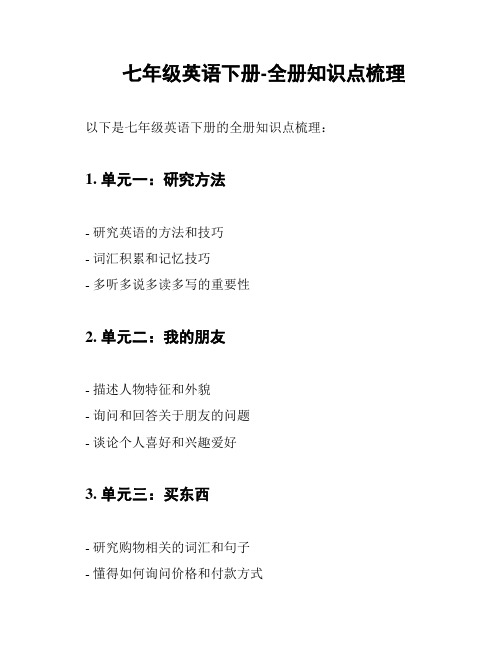
七年级英语下册-全册知识点梳理以下是七年级英语下册的全册知识点梳理:
1. 单元一:研究方法
- 研究英语的方法和技巧
- 词汇积累和记忆技巧
- 多听多说多读多写的重要性
2. 单元二:我的朋友
- 描述人物特征和外貌
- 询问和回答关于朋友的问题
- 谈论个人喜好和兴趣爱好
3. 单元三:买东西
- 研究购物相关的词汇和句子
- 懂得如何询问价格和付款方式
- 学会表达自己的购物意愿和偏好4. 单元四:我的学校
- 研究学校相关的词汇和句子
- 描述学校和课堂环境
- 谈论研究内容和学科
5. 单元五:我的生活
- 研究日常生活相关的词汇和句子- 描述自己的生活惯和家庭
- 谈论日常活动和时间安排
6. 单元六:我的假期
- 研究度假和旅行相关的词汇和句子- 描述过去和将来的假期计划
- 谈论旅行经历和感受
7. 单元七:我喜欢运动
- 研究运动项目和运动器材的词汇
- 喜欢和不喜欢的表达方式
- 谈论个人的体育运动经验和兴趣爱好
这份文档梳理了七年级英语下册的全册知识点,希望对你的学习有所帮助。
仁爱版丨七年级下册英语知识点总结!
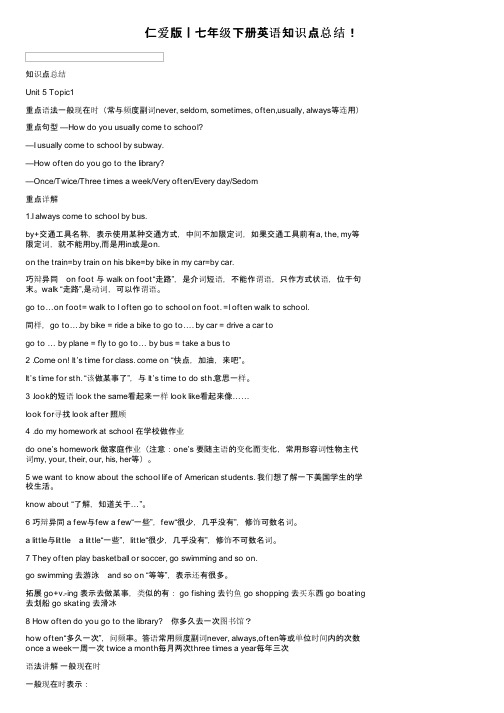
仁爱版丨七年级下册英语知识点总结!知识点总结Unit 5 Topic1重点语法一般现在时(常与频度副词never, seldom, sometimes, often,usually, always等连用)重点句型 —How do you usually come to school?—I usually come to school by subway.—How often do you go to the library?—Once/Twice/Three times a week/Very often/Every day/Sedom重点详解1.I always come to school by bus.by+交通工具名称,表示使用某种交通方式,中间不加限定词,如果交通工具前有a, the, my等限定词,就不能用by,而是用in或是on.on the train=by train on his bike=by bike in my car=by car.巧辩异同 on foot 与 walk on foot“走路”,是介词短语,不能作谓语,只作方式状语,位于句末。
walk “走路”,是动词,可以作谓语。
go to…on foot= walk to I often go to school on foot. =I often walk to school.同样,go to….by bike = ride a bike to go to…. by car = drive a car togo to … by plane = fly to go to… by bus = take a bus to2 .Come on! It’s time for class. come on “快点,加油,来吧”。
It’s time for sth. “该做某事了”,与 It’s time to do sth.意思一样。
七年级下册英语单元全册知识点归纳与复习总结
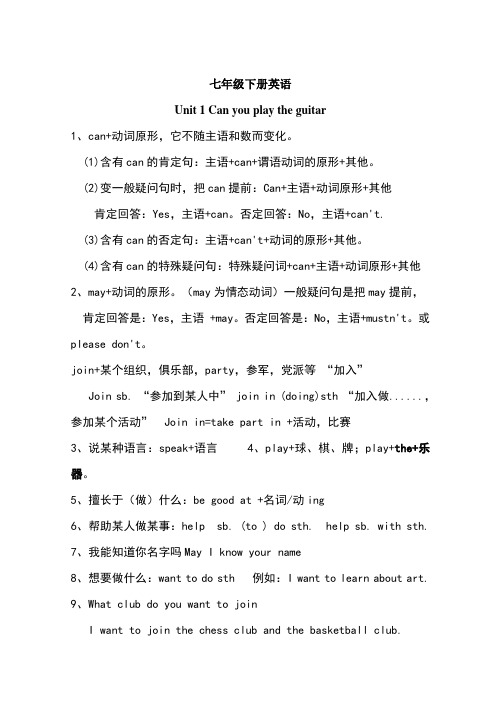
七年级下册英语Unit 1 Can you play the guitar1、can+动词原形,它不随主语和数而变化。
(1)含有can的肯定句:主语+can+谓语动词的原形+其他。
(2)变一般疑问句时,把can提前:Can+主语+动词原形+其他肯定回答:Yes,主语+can。
否定回答:No,主语+can't.(3)含有can的否定句:主语+can't+动词的原形+其他。
(4)含有can的特殊疑问句:特殊疑问词+can+主语+动词原形+其他2、may+动词的原形。
(may为情态动词)一般疑问句是把may提前,肯定回答是:Yes,主语 +may。
否定回答是:No,主语+mustn't。
或please don't。
join+某个组织,俱乐部,party,参军,党派等“加入”Join sb. “参加到某人中” join in (doing)sth “加入做......,参加某个活动” Join in=take part in +活动,比赛3、说某种语言:speak+语言4、play+球、棋、牌;play+the+乐器。
5、擅长于(做)什么:be good at +名词/动ing6、帮助某人做某事:help sb. (to ) do sth. help sb. with sth.7、我能知道你名字吗May I know your name8、想要做什么:want to do sth 例如:I want to learn about art.9、What club do you want to joinI want to join the chess club and the basketball club.10、What club does Tom want to join He wants to join the swimming club .11、He can’t play the violin or the piano. Can you help kids with swimming12、Why do you want to join the English club Because I want to learn English well.Unit 2 What time do you go to school1、what time和when引导的特殊疑问句。
英语七年级下册知识点归纳

七年级下册英语知识点归纳一、词汇1.重点单词-can(情态动词,能、会);dance(跳舞、舞蹈);swim(游泳);sing (唱歌);draw(画画);speak(说、讲);join(参加、加入);club(俱乐部);tell(告诉、讲述);story(故事、小说);write(写作、写字);show (演出、节目);or(或者、也不);talk(交谈、谈话);guitar(吉他);piano (钢琴);violin(小提琴);also(也、而且);people(人、人们);home (家、活动本部);make(使成为、制造);today(在今天、当今);center (中心、中央);weekend(周末);teach(教、讲授)。
-get up(起床、站起);dress(穿衣服、连衣裙);brush(刷、刷净);tooth(牙齿);shower(淋浴、淋浴器);usually(通常地、一般地);forty(四十);never(从不、绝不);early(早的);fifty(五十);job(工作、职业);work(工作);station(电(视)台、车站);o'clock(……点钟);night(晚上、夜晚);funny(奇怪的、滑稽好笑的);exercise(锻炼、练习);best(最好的、最好地);group(组、群);half(一半、半数);past(晚于、过(时间));quarter(一刻钟、四分之一);homework(家庭作业);run(跑、奔);clean(打扫、弄干净);walk(行走、步行)。
- take the subway / train / bus(乘地铁/火车/公共汽车);ride a bike / walk(骑自行车/步行);every day(每天);by bike / bus / subway(骑自行车/乘公共汽车/乘地铁);think of(认为);between…and…(在……和……之间);cross (横过、越过);river(河、江);many(许多);village(村庄、村镇);bridge (桥);boat(小船);ropeway(索道);year(年、岁);afraid(害怕、畏惧);like(像、怎么样);leave(离开、留下);dream(梦想、睡梦);true (真的、符合事实的)。
- 1、下载文档前请自行甄别文档内容的完整性,平台不提供额外的编辑、内容补充、找答案等附加服务。
- 2、"仅部分预览"的文档,不可在线预览部分如存在完整性等问题,可反馈申请退款(可完整预览的文档不适用该条件!)。
- 3、如文档侵犯您的权益,请联系客服反馈,我们会尽快为您处理(人工客服工作时间:9:00-18:30)。
七年级英语下册知识点总结牛津上海版Module1Garden City and its neighboursUnit1Writing a travel guideUnit2Going to see a filmUnit3A visit to Garden CityUnit4Let’s go shopping1.How are you getting on with your travel guide?get on with“进展”;“与……相处(融洽)”I’m getting on well with the preparation.How are you getting on with your new classmates?2.be famous for…(以/由于……出名)be(well)known as…(以/作为….被人知晓)Shanghai is famous for its night views.Shanghai is also known as a“Shopping Paradise”becausethere are a lot of department stores and huge shopping centres.上海被誉为“购物天堂”,因为上海有很多百货商店和大型购物中心。
Qingpu is famous for its fish and rice.3.It is+adj.+that(主语从句),表示“……太……了”It is wonderful that we can have dinner on the91st floor in Shanghai World Financial Centre.It is not surprising that many tourists come to visit Shanghai every year to shop.It is+adj.+to do sth.It is convenient to travel between Pudong and Puxi.=To travel between Pudong and Puxi is convenient.It is terrible to have dinner in this restaurant.The food tastes awful.=To have dinner in this restaurant is terrible.4.If you go there,you will see a huge open area with green grass,trees, fountains and pigeons.主句用一般将来(或can,may,must),从句用一般现在时。
Firemen will have no water to put out fires if there is no rain.We’ll go on an outing if it doesn’t rain tomorrow.If you go there,you can find a famous church.5.The Maglev takes you to the international airport in about eight minutes.磁悬浮列车可以在八分钟之内将你带到国际机场。
take sb.to…“带某人去某地”in+时间段,表示1.“在......之内”;2.“在……之后”My father used to take me to the park nearly every weekend.It takes you about eight minutes to travel to the international airport by Maglev.The artist could draw a horse in five minutes.I would like to be an English teacher in10years’time.My father will be back from Australia in a week.Travelling in ShanghaiShanghai is in the east of China.It is an international city.It is famous for its night views,local snacks.It is also known as a“Shopping Paradise”because there are a lot of department stores and shopping centres.If you go to Shanghai,you will see People’s Square.It is in the centre of Shanghai.If you go to Pudong,you can see the Oriental Pearl TV Tower and Shanghai Science and Technology Museum.The Maglev takes you to the international airport in about eight minutes.At Sheshan you will find a famous church and an observatory.In Yu Garden,you can eat different kinds of local snacks.There are many interesting places in Shanghai.Therefore,it is not surprising that tourists come to visit Shanghai every year!6.take(have)a look at...=look at…Let’s take(have)a look at the film guide.Would you like to have a look at the photo?7.hate to do sth.=hate doing sth.不喜欢,讨厌I hate action films.(I hate seeing action films./I hate to see action films.)8.It’s an action film and it’s very exciting.action film(武打片,动作片);love story(爱情片); cartoon(卡通片);exciting film(惊险片);cowboy story(西部片);horror story(恐怖片);police story(警匪片);documentary(纪录片)9.be full of…“充满,挤满”(状态)be filled with…“灌满,装满”(动作)The bottle is full of milk.(The bottle is filled with milk.)At lunch time,the school dining room is always full of people.Our English teacher is a man full of energy.The street is full of people.(句意不变)→The street is crowded with people.10.--How long is the film?电影片长多久?--It’s120minutes.→How long does the film last?It lasts80minutes.The duration of“Swan Lake”is80minutes.11.How much are they going to pay for the tickets altogether?Sb.pays…for sth.I paid90yuan for the coat last Saturday.→How much did you pay for the coat last Saturday?Sth.costs sb.…The coat cost me90yuan last Saturday.The experiment cost him two years of hard work.Sb.spends…on sth.Every morning Peter spends half an hour on/(in)reading English.I spent one and a half hours doing my homework last night.It takes sb.…to do sth.It took us30minutes to get to the Grand View Garden by car.It takes me five minutes to walk to school in the morning.You can take a bus there.(You can go there by bus.)We took a cable car up to the top of the mountain.Welcome to SheshanSuggested questions:1.Where is Sheshan in Shanghai?2.Which places can you visit in Sheshan?3.How can you go there and what do you think of Sheshan?Sheshan is in the southwest of Shanghai.It’s about30kilometres away from the centre of the city.There are many interesting places in Sheshan.You can visit the Forest Parkand there is a famous church at the top of the mountain.If you go there,you can also find an observatory.It’s a beautifulresort.You can go there by bus.I think you will enjoy yourself there.12.for prep.达(时间段)之久;since prep.&conj.自从(过去时间点)以来My uncle has been in the Army for3years.=(My uncle joined the Army3years ago.)Peter has worked in this company since2005.=(Peter started to work in this company in2005.)=(Peter has worked in this company for4years.)I have had the digital camera for2years.=I bought the digital camera2years ago.My grandfather has lived in the old town since he was born.I haven’t seen you for a long time.His father has been in Shanghai for quite a few years.13.Aunt Betty works in a company in Beijing,doesn’t she?She often has lunch at school,doesn’t she?It’s very cold today,isn’t it?Your father is unhappy,isn’t he?It is impossible to learn English well without remembering more words, isn’t it?My sister never tells a lie,does she?She can hardly speak Chinese,can she?He was seldom late for school,was he?I am an English teacher,aren’t I?(注:回答此类问题时,应按实际情况当一般疑问句作答,用Yes或No;但回答“前否后肯”的句子时,它的中英文意思则不同。
